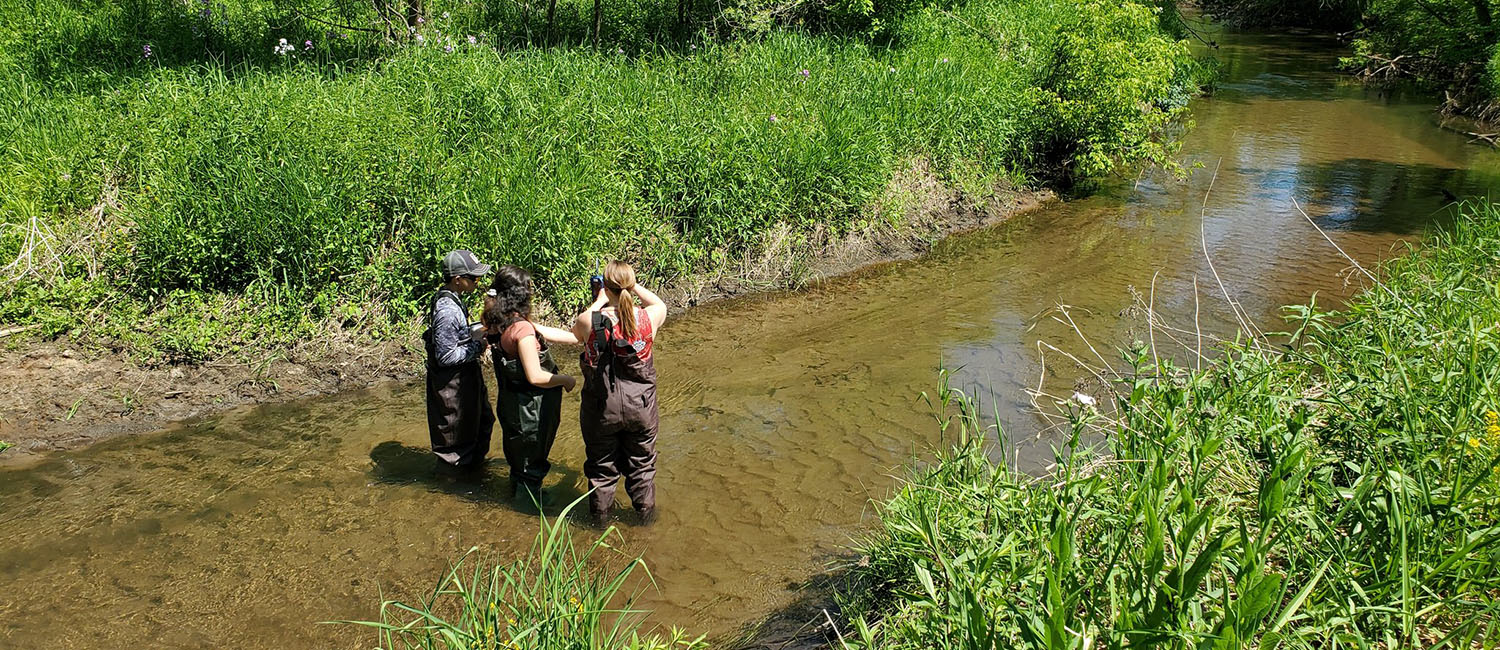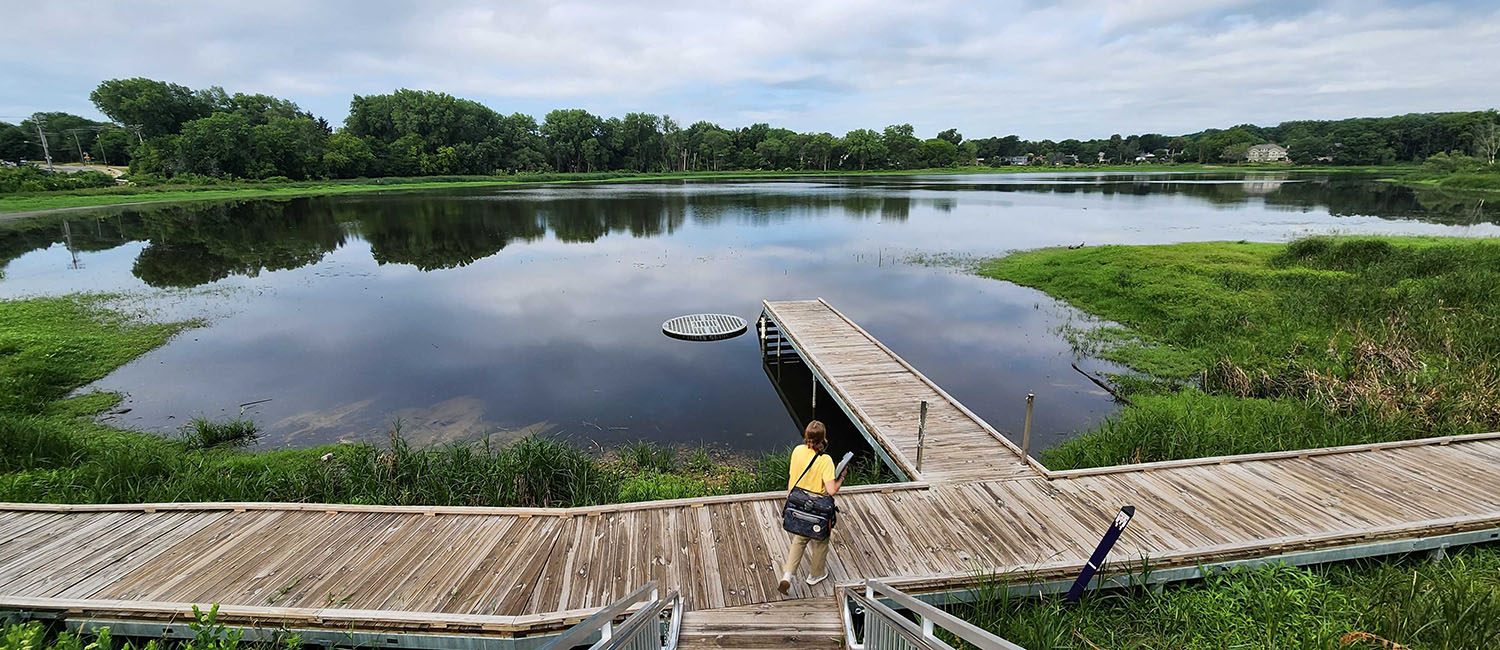Author: Heidi Jeter
A Western Wisconsin Hub for Freshwater Education
Western Wisconsin is becoming a hub for preparing for careers in water industries, thanks in part to two cross-campus collaborations — a high school summer camp and an advanced field course for upper-level college students — involving UW-Eau Claire, UW Oshkosh, UW-River Falls and UW-Stout.
Faculty from the four campuses embarked on this growing partnership — funded by the Freshwater Collaborative of Wisconsin — three years ago when they piloted a high school summer camp. In its third summer in 2023, faculty worked with the Department of Public Instruction to promote the opportunity to students throughout the state of Wisconsin. As a result, the camp grew from 14 students from the Eau Claire area the first year to 23 students from nine high schools across Wisconsin, including seven students from the Milwaukee and Madison areas.
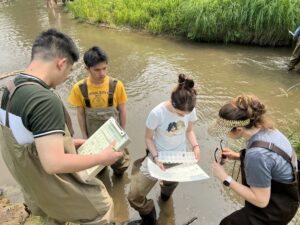
Camp participants learn about wetlands, fish, invasive species, Great Lakes beaches and contamination, and academic programs and careers focused on water science. Each day is spent in a different location, where they are taught by faculty from the four universities. The idea is to help high school students experience what it’s like to work in water science and to share what the UW schools have to offer in terms of hands-on coursework and internships that will prepare them to enter Wisconsin’s workforce — where their skills are critically needed.
“It’s good for students to have exposure to a variety of instructors from different campuses,” says Sarah Vitale, associate professor at UW-Eau Claire and the lead faculty member for the summer camp project. “They can learn they can get a really good job in this field with a bachelor’s degree, or if they go in this direction a master’s degree is recommended. Getting this kind of advice early helps them make decisions.”
The program has evolved to give students more applicable experience and an opportunity to meet and work alongside undergraduate students who are part of other Freshwater Collaborative-projects. For example, while at UW-Stout last summer, students worked in the field with research students funded by the Red Cedar Basin Monitoring Project.
Many of the same faculty are involved in the advanced fieldwork course for undergraduates.
“The high school course showcases the excellent curriculum and research opportunities available to students should they choose to attend a UW school in western Wisconsin while the undergraduate course diversifies student experiences,” says Nicole Hayes, assistant professor of biology at UW-Stout. “UW-Stout students gain valuable insights from working with professors from UW-Eau Claire, UW Oshkosh and UW-River Falls.”
The two-week advanced course immerses students in wide variety of applicable fieldwork to prepare them for different kinds of jobs. For example, they did a remote sensing analysis on Lake Menomin and then used what they learned to analyze a body of water near their hometown or where they vacation in the summer. They also learned about wetlands and how they are integrated with groundwater, storm water, soils, and surface waters.
Abbigale Coffin, an environmental biology and ecology major at UW-Eau Claire, took the course in 2022 and was a teaching assistant for it in 2023. The course opened her eyes to how interconnected ground and surface waters are, and she gained the confidence and knowledge to perform tests and handle equipment independently.
“The amount of hands-on experience really prepares you for working and collecting data in the field,” Coffin says. “All the knowledge I gained from this class at least doubled the list of skills on my resume and allowed me to discover my passion for protecting our state’s ground and surface water.”
The Freshwater Collaborative recently granted new funds to continue years four and five of the high school camp and years three and four of the advanced fieldwork summer course for undergraduates. The group will continue to enhance both courses, tapping into the strengths of each university and refining the curriculum to ensure it has direct application to the workforce. The advanced course is also intended to be part of future certificate programs the Freshwater Collaborative plans to roll out.
“It’s been exciting to see this cross-campus collaboration grow and connect with other projects we are funding,” says Marissa Jablonski, executive director for the Freshwater Collaborative. “It is a great example of how we are creating a pipeline to jobs by implementing programs that recruit young people to UW schools and then provide them with hands-on experiences that train them for the water workforce.”
Freshwater@UW Program Offers Plunge Into Summer Research
When it comes to freshwater research, where better to get hands-on experience than at one of the University of Wisconsin campuses?
In summer 2023, 31 undergraduates from Wisconsin, California, Maryland, Michigan, Minnesota, Nebraska, Ohio, Rhode Island, Texas, Illinois, Alabama and Virginia participated in the Freshwater@UW Summer Research Opportunities Program, gaining valuable research, career-building and life experiences.
Led by UW-Madison, the program is supported by the Freshwater Collaborative of Wisconsin, Wisconsin Sea Grant, Water@UW-Madison, the University of Wisconsin Water Resources Institute and the UW-Madison Graduate School.
“The program’s central aim is to support the growth of our freshwater research enterprise and freshwater workforce through collaborative, cross-system programming designed to train, recruit, retain and diversify the next generation of freshwater professionals,” says Alison Mikulyuk, the program coordinator.
The program began as a pilot in 2022 and expanded to include any UW campus in 2023. This year, students participated in research at one of seven UW institutions: UW-Eau Claire, UW-Green Bay, UW-La Crosse, UW-Madison, UW-Milwaukee, UW Oshkosh and UW-Superior.
Students accepted into the research program were matched with faculty whose interests match their own. They participated in a weeklong orientation in Madison and spent the remainder of the summer conducting paid hands-on research at their chosen campus. In addition to working one-on-one with faculty and graduate student mentors, students met in person and online each week to discuss career paths, navigating graduate school, communicating science, public service and research practices.
To close out the summer, the cohort presented the results of their hard work at the Summer Research Symposium at UW-Madison in August. Each scholar presented a research flash talk to an audience of more than 100, followed by a research poster session that was well-attended by their mentors, family, and members of the public.
“I was extremely impressed by the work these young researchers presented,” Mikulyuk says. “It was a fantastic representation of the variety and quality of freshwater research conducted in our state.”
During the summer, the students were asked to reflect in writing on their experience as a Freshwater@UW Scholar. Below are edited sections of what a few of the students had to say about their experiences in the program. Longer reflections will be posted to the Sea Grant blog over the next months.
“One of my favorite parts of this experience was being able to interact closely with faculty from a university that was not my own. This experience gave me the opportunity to learn things that I would not have had the chance to learn at my university and opened my eyes to the various fields of geology. Being able to interact with students from different universities was also beneficial, as I was able to hear what others’ college experiences were like, as well as the research being conducted at other universities.” ~ Samantha Krueger, UW-Whitewater, conducted research at UW-Madison and won a Best Talk Award at the symposium
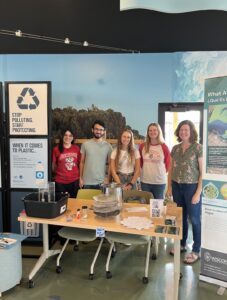
“Being in the lab and sampling is something I love, but this summer, I realized I also enjoy outreach. I had never experienced an outreach event before, but I was given the opportunity to travel to Superior, Wisconsin, for Lake Superior Day. This was one of the first times in my life that I got to talk to people at a big event who all have the same passion for the environment.” ~ Chloe Mellgren, Carthage College in Kenosha, conducted research at UW-Madison and won a Best Talk Award at the symposium
“Through my research, I learned a lot about the potential of using industrial byproducts to create sustainable solutions to environmental problems. My favorite part of the program was meeting and interacting with faculty and students from UW-Green Bay, as it allowed me to learn from experts in the field and gain new perspectives on my research.” ~ Su Than Thar, Ripon College, conducted research at UW-Green Bay
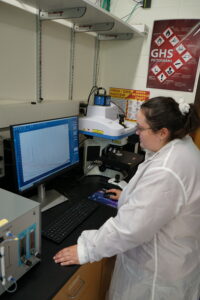
“Outside of my time conducting research, the program also provided me many opportunities for professional development. I gained insight into grad school. I also got to learn about career opportunities present with federal employment. I am so thankful for the freshwater program and all the knowledge and experiences it provided me!” ~ Kara Eppard, Bridgewater College in Virginia, conducted research at UW-Madison with USGS
“I enjoyed the fact that I was able to meet and collaborate with other students this summer. I will forever remember this experience and go on to make great use of the skills I acquired from the program.” ~ Ryan Waln, UW-Whitewater, conducted research at UW-Green Bay
In July 2023, Freshwater Collaborative granted nearly $600,000 to UW-Madison to continue the Freshwater@UW Summer Research Opportunities Program for its third and fourth years. The funding will provide immersive, hands-on mentored research experiences to 27 undergraduates to participate in summer research at one of the 13 UW institutions.
Freshwater Collaborative of Wisconsin Awards $4.34 Million in Funding to Bolster Student Training and Workforce Development in Freshwater
Projects Also Supports Research for Statewide Grand Water Challenges Including PFAS and Phosphorus Pollution
MILWAUKEE, Wis., Aug. 16, 2023 — The Freshwater Collaborative of Wisconsin has awarded more than $4.3 million in funding for 22 projects that will increase research and training opportunities for high school and undergraduate students and will address Wisconsin’s biggest water challenges, including emerging contaminants such as PFAS and agricultural water management issues such as phosphorus pollution.
“The collaboration of our public universities to protect and preserve Wisconsin’s freshwater will pay dividends for every Wisconsinite for generations,” said UW System President Jay Rothman. “Using the resources and expertise we have at all our 13 universities leverages Wisconsin’s extraordinary higher education system. I am very proud of the work of our students, faculty, and staff on this important initiative.”
Funding will support expansion of summer research programs that allow students from Wisconsin and across the nation to conduct freshwater research at one of the UW System campuses; summer programs for high school students to educate them about careers in the water industry; and university-led research projects that help fulfill community and government agency needs for water quality monitoring. Numerous projects will address PFAS, “forever chemicals” used in everyday products that have been shown to cause significant health issues in humans and which have been identified at high levels in drinking water throughout the state.
“The most exciting thing about this latest round of funding is seeing how programs are becoming more interconnected. For example, high school students attending a summer camp in western Wisconsin are interacting with undergraduate students and faculty who are working on other Freshwater Collaborative–funded projects throughout the state,” said Marissa Jablonski, executive director for the Freshwater Collaborative of Wisconsin. “We can really see how these connections are building a pipeline from college recruitment to jobs in freshwater in Wisconsin.”
Grant descriptions for the latest funded projects are available at freshwater.wisconsin.edu/freshwater-collaborative-funded-projects-2023.
The funding is part of a statewide initiative, backed by the Wisconsin State Legislature and Gov. Tony Evers, to tackle Wisconsin’s grand water challenges and support curriculum development, undergraduate research opportunities, career development, and field training experiences for students interested in studying water-related fields at the 13 UW universities.
Contact: Heidi Jeter
Freshwater Collaborative of Wisconsin
hjeter@uwm.edu, 414-251-7445

